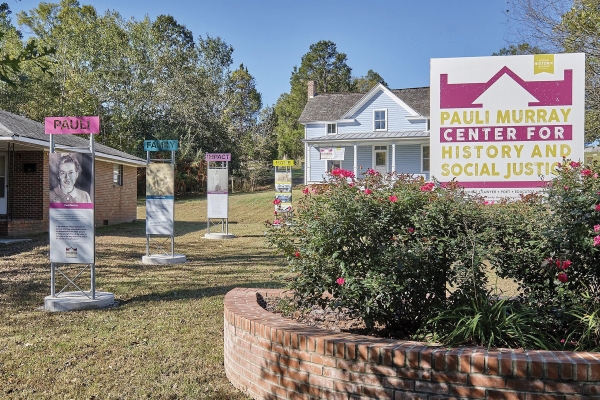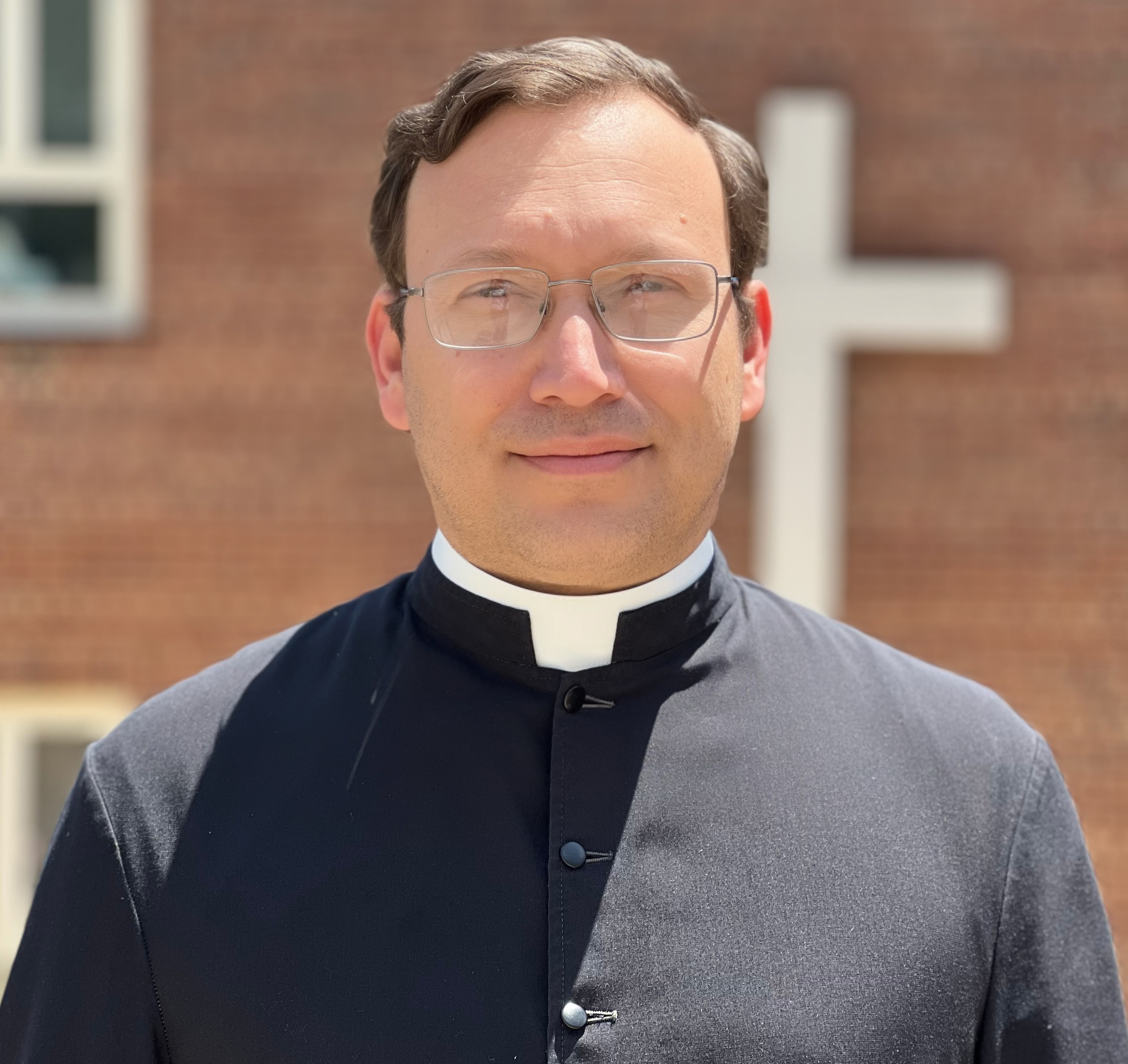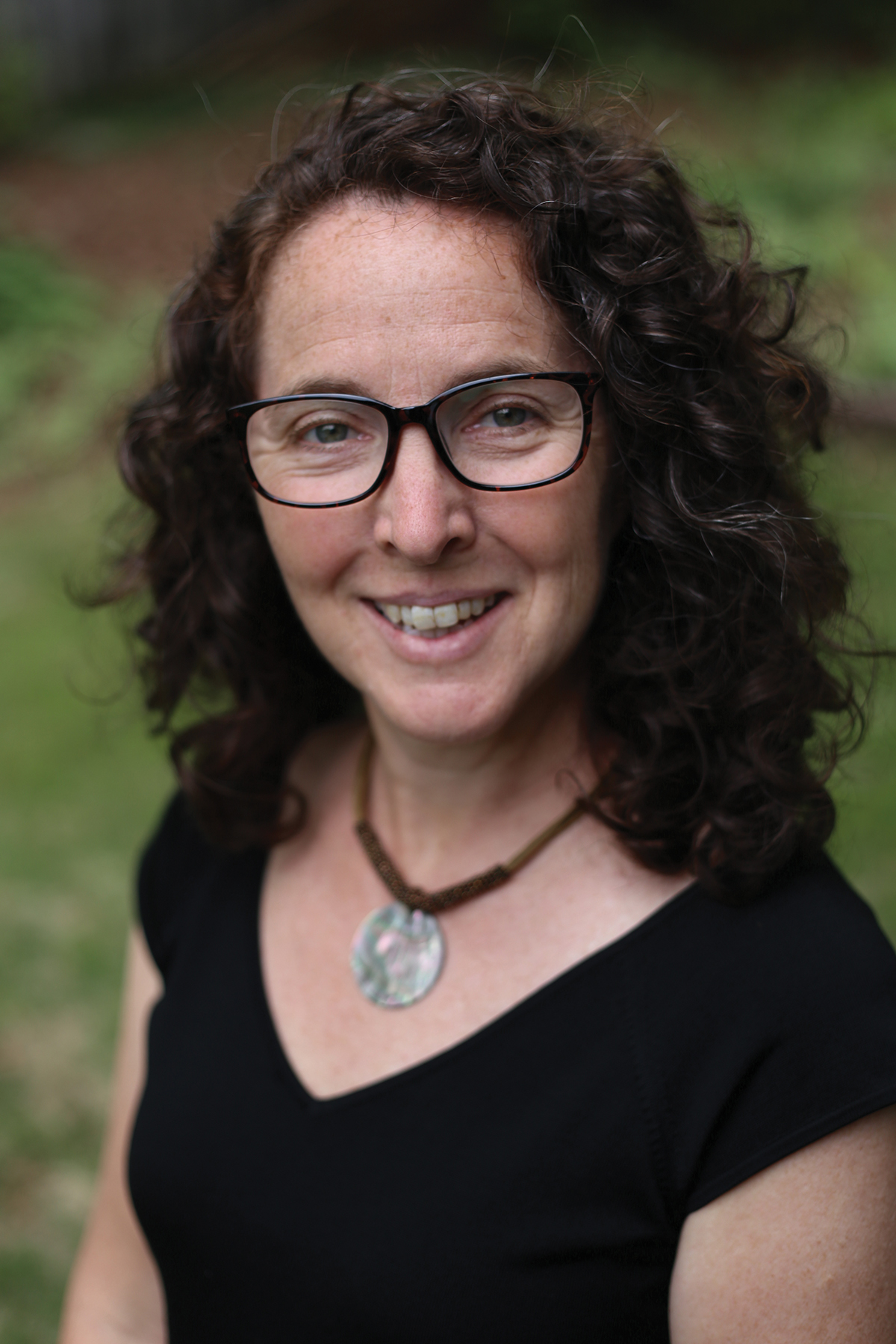Disciple: The Pauli Murray Center Celebrates 10 Years

By Sophia Ross-Hurtado and Barbara Lau
Ten years ago, the Pauli Murray Center (PMC) was established to steward the future of the Rev. Dr. Pauli Murray’s childhood home and to lift up their prophetic life and legacy through programming and media.1 After being alerted by our West End neighbors, a coalition of Murray/Fitzgerald family members, organizations, church groups and PMC leaders rallied to prevent the demolition of the 1898 Durham home. The PMC envisioned transforming the historic home into a gathering space that invites a diversity of communities to be inspired by Murray’s values, to connect history to contemporary issues, and to advance their vision for liberation and reconciliation. What was once an aspirational startup has been transformed into a space for connection, dialogue and learning.
[Image: The Pauli Murray Center’s outdoor educational exhibit and sign invites visitors to learn more about Durham, Pauli Murray and the historic site. Photo by Brad Bunyea, courtesy of the Pauli Murray Center for History and Social Justice]
THE PIONEER
Murray drew from their own experience of discrimination based on race and gender to fuel the creation of legal theories that continue to shape society today. At Howard University School of Law, Murray coined the term “Jane Crow” to describe discrimination at the intersection of race and gender. They challenged racial segregation on buses and in higher education. Murray, in fact, crafted the legal strategies used by NAACP lawyer Thurgood Marshall in Brown v. Board of Education (1954) and ACLU lawyer Ruth Bader Ginsburg in Reed v. Reed (1971) to declare discrimination based on race and gender unconstitutional in the Supreme Court.
Murray was a prolific writer, and words were a powerful weapon in their activism. Writing poetry was central to their self-understanding and a powerful expression of their beliefs and feelings. Murray also wrote the powerful family memoir Proud Shoes and an autobiography, Song in a Weary Throat. Murray was well known for their powerful letters to national leaders, including Eleanor Roosevelt. Their correspondence led them to become personal friends, and Murray served as a trusted advisor to Roosevelt on civil and human rights issues.
In 1977, Murray was the first Black person perceived as a woman to be ordained an Episcopal priest. As a faith leader, Murray supported healing, self-love, and the full integration of body, mind and spirit. They considered the participation and nurturing of community to be integral to one’s personal and spiritual growth.
Pivotal to my relatedness to God, on the one hand, and to my neighbor, on the other, is my relationship to myself. Unless I love and accept myself, I am not free to love and accept my neighbor. Loving myself in this context simply means self-respect, a self-regard born of the realization that I am the object of God’s limitless love and mercy, part of his creation. Self-acceptance does not mean uncritical self-approval, but self-understanding, awareness of my strengths and weaknesses, and the blessed assurance that God-in-Christ is working in me and through me toward the perfection of my life.
- The Rev. Dr. Pauli Murray, excerpt from sermon titled “The Second Great Commandment”
PRESERVING THE LEGACY
The Pauli Murray Center is an ongoing work in progress. Murray’s childhood home is the anchor on a site named a National Treasure by the National Trust for Historic Preservation in 2015 and designated a National Historic Landmark by the National Park Service in 2016. Its place on the National Register of Historic Places is especially significant, as only 2% of the 95,000 sites on the registry are dedicated to the experiences of Black Americans. The PMC is working to become a model other communities may follow to showcase the accomplishments of people of color as well as women and members of the LGBTQ+ community.
The PMC uplifts Murray’s vision of faith by creating virtual spaces for spiritual connection, while we continue to renovate the historic home into a pilgrimage site for people to visit, reflect and pray. Additional programming includes a monthly book club, walking tours, workshops and educational curriculum. Visitors are encouraged to visit the Center and enjoy the lawn installation of photographs and information about Murray, their family, their impact and their historic home.
“Pauli’s church tradition was grounded in scripture, tradition and reason, and put a high premium on human experience. Rather than do’s and don’ts, Christianity was about wonder, beauty and growing in one’s love and understanding of God, self and neighbor. While Pauli was at times in tension with the church, overall, faith was a source of solace that provided spiritual connection…”
- Donyelle McCray, PhD, panel “Showing Up Whole: Pauli Murray’s Courageous Life” on February 18, 2022
LEARN MORE
There are several opportunities to get involved with the Pauli Murray Center this summer; to learn more, visit paulimurraycenter.com.
In honor of its 10-year anniversary, the PMC is hosting a celebration at the house on June 18, 10 a.m.-12 p.m. Everyone is invited to participate in the festivities. Join us for dancing, artmaking, “meeting” the Fitzgerald ancestors, a preview of our Education & Welcome Center design and a special unveiling of a new gift to the Center, one of Pauli Murray’s personal typewriters.
The annual service marking the feast day of the Rev. Dr. Pauli Murray will be held at St. Titus’, Durham, on June 22 at 7 p.m. The Rt. Rev. Anne Hodges-Copple will serve as officiant and the Rev. Winnie Varghese, rector of St. Luke’s, Atlanta, will preach. The service will be streamed on St. Titus’ and the Pauli Murray Center’s social media.
On Saturday, June 25, join the Pauli Murray Pilgrimage: Walk + Reflect, a spiritual journey through locations of importance to Murray in Durham. Along this curated 4.5-mile walk, participants will receive selected prayers, meditations and conversation starters to encourage reflection and learning about the history of Durham and its importance in Murray’s legacy. This self-guided exploration begins and ends at the Pauli Murray Center, located at 906 Carroll Street. Meet us at 8, 9 or 10 a.m. for a brief introduction to the pilgrimage; however, you can arrive at the house and begin the journey anytime 8-11 a.m. The link to register will be shared on the PMC’s website, newsletter and social media.
The Pauli Murray Center’s exhibit, Pauli Murray: Imp, Crusader, Dude, Priest, will be at the North Carolina Museum of History in Raleigh. The exhibit uses life-size photographs, an annotated timeline, quotes and interactive elements to introduce visitors to Pauli Murray. The exhibition will be open to visitors from May 28 through November 27.
Sophia Ross-Hurtado is the Program and Communications Coordinator for the PMC. Barbara Lau is the Executive Director of the PMC.
 Canon Missioner for Black Ministries
Canon Missioner for Black Ministries
 Canon Missioner for Diocesan Restitution and Reparations Ministry
Canon Missioner for Diocesan Restitution and Reparations Ministry
 Deacon for Anti-racism and Reconciliation
Deacon for Anti-racism and Reconciliation
 Canon Missioner for Latino/Hispanic Ministry
Canon Missioner for Latino/Hispanic Ministry
 Mission Strategy Coordinator
Mission Strategy Coordinator
